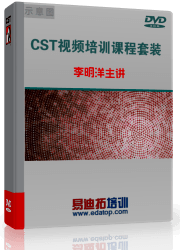- 易迪拓培训,专注于微波、射频、天线设计工程师的培养
A problem in setting excitation (plane wave) in CST
zjuqsr,
I always use linear plane waves because they are easier to envision ... but doesn't the refrence frequency have to do with the revolutions/sec of the wave around the propogation axis?
Dear EMCDude2:
Thanks for your reply, but the revolutions/sec of the wave around the propogation axis is the same as the frequency of the polarized wave, right? So the so-called "ref. frequency" is the same as frequency? Then what does the word "ref." mean? Thank you.
I can't give you a for sure answer but maybe I can offer some clues.
I'm assuming you are using the transient (FIT) solver on Microwave Studio -- so perhaps look at it from a time domain perspective. Your excitation is probably a gaussian pulse which contains all frequencies that were specified by you in the frequency settings of the model so that hasn't changed. My thought is that the frequency content of the excitation is not changed, but the polarization also has a frequency. Check out the picture I found from Wikipedia
File:Circular.Polarization.Circularly.Polarized.Li ght Right.Handed.Animation.305x190.255Colors.gif - Wikipedia, the free encyclopedia
Linear polarized waves do not require reference frequency so it's really pointing to something having to do with the polarization.
Why are you using circular polarization? I have not had anything come up that would really require it. Typically EM waves can be considered linear unless maybe you are talking about a wave from a spiral antenna of some sort.
It's so nice that you help me so much. I wiill think about it carefully. I use circular polarization because I'm stimulating something about circular dichroism. The certain structure requires this kind of wave.
申明:网友回复良莠不齐,仅供参考。如需专业解答,请学习易迪拓培训专家讲授的CST视频培训教程。
上一篇:CST MWS: S-Parameters
下一篇:Defining Ports for microstrip using CST

